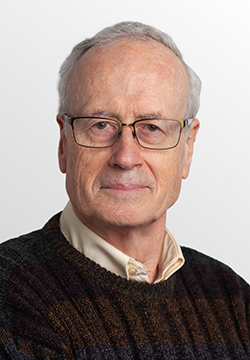Alexander B Murphy


Professor Alexander B Murphy
Honorary University Fellow (2023)
Geography has always been an integral part of Professor Alexander B Murphy’s life. Brought up in a geographical household, the second-generation geography professor got an early taste for different ways of life, spending some of his childhood in France, Hawaii and Japan. These formative experiences opened his eyes, nurtured his fascination with other countries and cultures, and paved the way for his future in the discipline.
Professor Murphy is a Professor Emeritus at the University of Oregon in the United States. The young Professor Murphy studied Archaeology at Yale University before moving to New York to study for a Law degree from Columbia University’s School of Law. While his Archaeology degree was part of a general liberal arts education, his subsequent Law studies and time spent as a practising lawyer in Chicago represented a significant phase of his life, as he not only met his future spouse, but also developed his understanding of how different cultural contexts shape different things—a product of his focus on international and comparative law.
Professor Murphy’s interest in how different approaches to law develop in various cultural and social contexts got him thinking about geography again, and it led to a doctorate in the discipline at the University of Chicago. Following his PhD, Professor Murphy settled in Oregon and turned his attention to research in political geography, as well as promoting rigorous geographic education programmes.
Throughout his academic career, Professor Murphy has focused on ways in which the changing political organisation of space reflects and shapes ethnic, socio-economic, and environmental processes. He has also worked to promote the importance of geographical education, helping younger generations address the critical challenges facing the contemporary world.
Professor Murphy believes that geography, the subject that has defined his career, gives us an appreciation for the world and a spatial perspective that is vital to understanding many issues and problems. That perspective has allowed the discipline to grow in line with social changes—helping us improve our understanding and sensitivity to environmental change, for example.
Apart from his distinguished research, Professor Murphy’s passion for teaching and education is a thread that runs through his life in academia. He notably led the attempt to add geography to the College Board’s Advanced Placement (AP) Program in the late 1990s in the United States, and the subsequent addition of the subject is one of his proudest achievements. From a humble start in the early 2000s with some 3,000 students studying AP Geography in North America, it has now expanded to over 250,000 a year, thus promoting a richer understanding of the discipline. He is gratified to have had the opportunity to play some role in expanding the impact of geography in schools.
In 2015, Professor Murphy moved from the United States to Hong Kong for a sabbatical, and he was appointed a distinguished fellow by the David C. Lam Institute for East-West Studies at Hong Kong Baptist University (HKBU). While in Hong Kong, he developed the ideas that would come to form his recent book Geography: Why It Matters, a publication that reflects his relentless efforts to promote the discipline. His time in the city also gave him a chance to get below the surface of the unique culture in Hong Kong, as well as explore Mainland China and other surrounding regions. Moreover, it gave him the opportunity to forge a close relationship with the HKBU Department of Geography, placing him in a position to lend his expertise as a Departmental Academic Advisor from 2015 to 2018 to the Department and the University in other advisory capacities.
Other awards and prizes have also acknowledged the multifaceted nature of his work, as he was elected to membership in the Academia Europaea in 2011, and he received the Association of American Geographers’ Lifetime Achievement Award in 2014.
Besides his distinguished body of scholarly work, which includes over 100 articles and several books, Professor Murphy is particularly proud of his record of mentoring students, and he derives great satisfaction from helping people. Throughout his career he has supervised over 25 doctoral students, half of whom have been women, which has subsequently helped to improve gender equality in what was once a male-dominated field.
Professor Murphy always advises students that no matter what they choose to do, they should not just focus on the rules and the game, but find something they are really passionate about. He tells his students that it is most important to take advantage of the breadth of possibilities that are out there, stretch themselves and go outside of their comfort zone. While technology continues to revolutionise geography and other fields, Professor Murphy opines that with the advent of new tools, such as generative artificial intelligence, it is important to understand and appreciate the power of these tools, but not to forget to think critically about them.
Professor Murphy is very grateful for the recognition of being made an Honorary University Fellow of HKBU, and he treasures the opportunity it presents for renewal with the institution. He views the honorary fellowship as an opportunity to cement his relationship with Hong Kong and reengage with the unique culture found in the city.
As a leading thinker and figure in his field, Professor Murphy’s wealth of experience and expertise within the world of geography has helped to shape research and education in Hong Kong, the United States and other parts of the world. He will be an invaluable asset to the younger generation of gifted students at HKBU, as well as the university community as a whole.